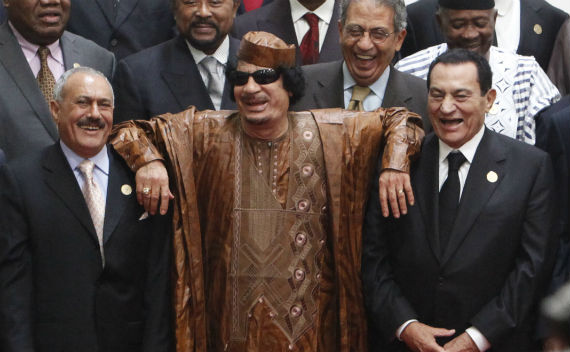Fallout from Qaddafi’s Death in Northern Nigeria
October 25, 2011 4:35 pm (EST)
- Post
- Blog posts represent the views of CFR fellows and staff and not those of CFR, which takes no institutional positions.
More on:

Libyan strongman Muammar al-Qaddafi’s relations with Nigeria were ambiguous and complex. He maintained a regular dialogue with both military and civilian governments in Abuja, though usually outside normal diplomatic channels. Nevertheless, within the past year, he gratuitously called for the splitting of Nigeria into two countries, one Christian, the other Muslim.
Among Nigeria’s Muslims, he was praised for providing significant financial support for Muslim institutions, including the Murtala Mohammed mosque in Kano. Many Nigerian Muslims were repelled by Qaddafi’s murder and the subsequent desecration of his remains, saying that because of his work on behalf of international Islam he should be forgiven.
Among Nigerian Christians, Qaddafi was often something of a bogeyman. They suspected him of financially supporting radical Islamic groups in the North, as well as legitimate Muslim institutions and charities. However, at the time, his call for the breakup of Nigeria received some support from anti-Islamic, often Pentecostal clergy.
The chairman of the Nigerian Council of Ulamas expressed the ambiguous views of many Muslim Nigerians about Qaddafi: “The killing of Qaddafi should serve as a lesson to Nigerian and world leaders ranging from local government chairmen to governors and so on. They should know that the most important thing a leader should do is to continue to be just to his followers, going by what has happened to a renowned leader like Qaddafi who had made his mark in the international community. Look at how he has ended in the hands of criminals who call themselves liberators of the Libyan people.”
Nigeria, a current, non-permanent member of the UN Security Council, voted in support of the resolution authorizing NATO action to protect Libyans from Qaddafi. However, as the NATO mission unfolded, many Nigerians, especially Northern Muslims, became increasingly critical of it.
According to the press, negative reaction to Qaddafi’s killing in the predominately Muslim North has resulted in the Nigerian security services taking “proactive measures” to “forestall the breakdown of law and order.” In particular, the police have increased their check points, especially in Kaduna and Maiduguri. According to the Kaduna state police commissioner, “In view of the news of the demise of the hitherto strongman of Libya and its condemnation in some quarters of the society, the Kaduna State Police Command has increased its patrols both foot and vehicular in the entire state so that mischief makers will not cash in and take advantage to cause mayhem.” A spokesman for the State Security Service said that surveillance of religious leaders, especially preaching, had increased: “We have identified some people who had started devising tactics to cause havoc in the state, but we are closing in on them and we will make sure they are isolated.”
Northern Nigeria remains a tinder box, with regular killings that the government blames on “Boko Haram,” a radical Muslim movement, and widespread alienation from the Abuja government. So, the enhanced security measures are no surprise. But, rough security service behavior – including allegations of extra-judicial killings and ubiquitous shake-downs at police checkpoints – has probably made the security situation worse in Maiduguri and other parts of the North. For many Muslims, the “face” of the Abuja government is the police, who are widely hated and are often targeted for killing by radical groups. Therefore, it is legitimate to ask whether further beefing up the police and the military now in the North is wise or whether it will merely increase that region’s alienation from the Abuja government.
More on:
 Online Store
Online Store
